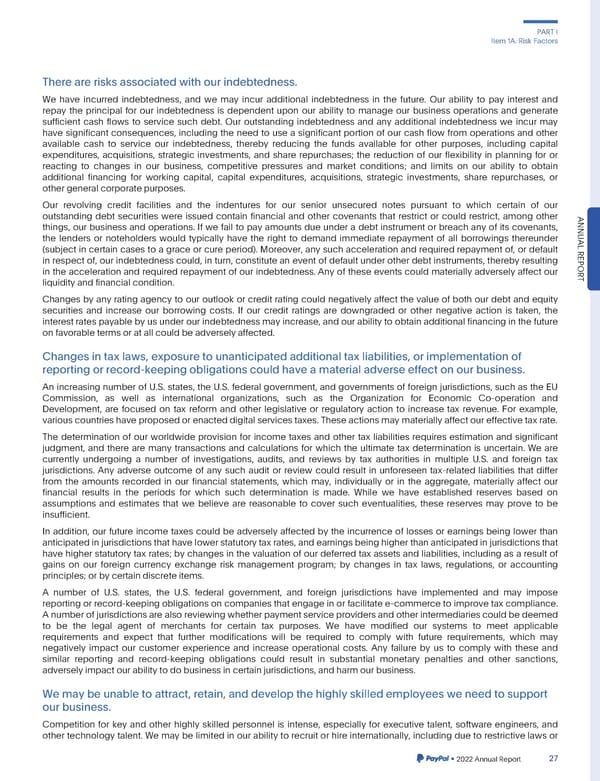PARTI Item1A.RiskFactors Therearerisksassociatedwithourindebtedness. We have incurred indebtedness, and we may incur additional indebtedness in the future. Our ability to pay interest and repay the principal for our indebtedness is dependent upon our ability to manage our business operations and generate sufficient cash flows to service such debt. Our outstanding indebtedness and any additional indebtedness we incur may have significant consequences, including the need to use a significant portion of our cash flow from operations and other available cash to service our indebtedness, thereby reducing the funds available for other purposes, including capital expenditures, acquisitions, strategic investments, and share repurchases; the reduction of our flexibility in planning for or reacting to changes in our business, competitive pressures and market conditions; and limits on our ability to obtain additional financing for working capital, capital expenditures, acquisitions, strategic investments, share repurchases, or othergeneralcorporatepurposes. Our revolving credit facilities and the indentures for our senior unsecured notes pursuant to which certain of our outstanding debt securities were issued contain financial and other covenants that restrict or could restrict, among other ANNU things, our business and operations. If we fail to pay amounts due under a debt instrument or breach any of its covenants, the lenders or noteholders would typically have the right to demand immediate repayment of all borrowings thereunder AL (subject in certain cases to a grace or cure period). Moreover, any such acceleration and required repayment of, or default REPOR in respect of, our indebtedness could, in turn, constitute an event of default under other debt instruments, thereby resulting in the acceleration and required repayment of our indebtedness. Any of these events could materially adversely affect our liquidity and financial condition. T Changesbyanyrating agency to our outlook or credit rating could negatively affect the value of both our debt and equity securities and increase our borrowing costs. If our credit ratings are downgraded or other negative action is taken, the interest rates payable by us under our indebtednessmay increase,and our ability to obtain additional financing in the future onfavorabletermsoratallcouldbeadverselyaffected. Changesintaxlaws,exposuretounanticipatedadditionaltaxliabilities,orimplementationof reportingorrecord-keepingobligationscouldhaveamaterialadverseeffectonourbusiness. Anincreasing number of U.S. states, the U.S. federal government, and governments of foreign jurisdictions, such as the EU Commission, as well as international organizations, such as the Organization for Economic Co-operation and Development, are focused on tax reform and other legislative or regulatory action to increase tax revenue. For example, various countries have proposedor enacteddigitalservicestaxes.Theseactionsmaymateriallyaffectoureffectivetaxrate. The determination of our worldwide provision for income taxes and other tax liabilities requires estimation and significant judgment, and there are many transactions and calculations for which the ultimate tax determination is uncertain. We are currently undergoing a number of investigations, audits, and reviews by tax authorities in multiple U.S. and foreign tax jurisdictions. Any adverse outcome of any such audit or review could result in unforeseen tax-related liabilities that differ from the amounts recorded in our financial statements, which may, individually or in the aggregate, materially affect our financial results in the periods for which such determination is made. While we have established reserves based on assumptions and estimates that we believe are reasonable to cover such eventualities, these reserves may prove to be insufficient. In addition, our future income taxes could be adversely affected by the incurrence of losses or earnings being lower than anticipatedin jurisdictions that have lower statutory tax rates, and earnings being higher than anticipatedin jurisdictionsthat have higher statutory tax rates; by changes in the valuation of our deferred tax assets and liabilities, including as a result of gains on our foreign currency exchange risk management program; by changes in tax laws, regulations, or accounting principles; or by certain discrete items. A number of U.S. states, the U.S. federal government, and foreign jurisdictions have implemented and may impose reporting or record-keepingobligations on companiesthat engage in or facilitate e-commerce to improve tax compliance. Anumberofjurisdictionsarealsoreviewingwhetherpaymentserviceprovidersandotherintermediariescouldbedeemed to be the legal agent of merchants for certain tax purposes. We have modified our systems to meet applicable requirements and expect that further modifications will be required to comply with future requirements, which may negatively impact our customer experience and increase operational costs. Any failure by us to comply with these and similar reporting and record-keeping obligations could result in substantial monetary penalties and other sanctions, adverselyimpactourabilitytodobusinessincertainjurisdictions,andharmourbusiness. Wemaybeunabletoattract,retain,anddevelopthehighlyskilledemployeesweneedtosupport ourbusiness. Competition for key and other highly skilled personnel is intense, especially for executive talent, software engineers, and other technology talent. We may be limited in our ability to recruit or hire internationally, including due to restrictive laws or •2022AnnualReport 27
 2023 Annual Report Page 174 Page 176
2023 Annual Report Page 174 Page 176